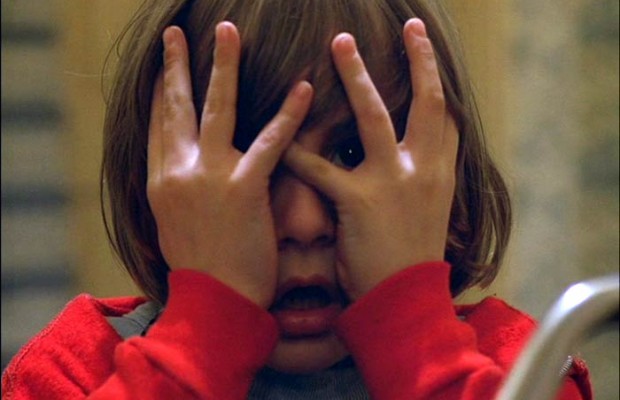“The Shining” Book vs. Movie

One of the most depressing, frustrating feelings in the world is when a brilliant book, such as Stephen King’s “The Shining,” is absolutely DESTROYED AND RUINED when turned into a film. “The Shining,” directed by Stanley Kubrick, is unthinkably terrible. Don’t be fooled by its place in amateur lists of “best horror movies,” and its title as a “classic”; the film throws out 96% of King’s brilliance and puts no thought into the important aspects of the characters or story.
The plot of both the book and the film revolve around the happenings of the Torrance family. In the book, Jack Torrance is an ex-alcoholic, who occasionally loses his temper. He and his wife, Wendy, have both dealt with rather unpleasant pasts and parents. Jack’s dad was abusive, especially to his wife, and his father’s alcoholic tendencies influenced Jack himself as an adult. Their son, Danny, possesses a special power called “the shining,” which allows him to see events that have occurred in the past , see possible future events, and look into people’s minds to read their thoughts. Danny’s power is particularly strong.
The book goes into great detail about the pasts of these three characters, and fully explains the unfortunate details that led them to the Overlook hotel, a wild and dangerous place for someone with the ability to shine. Countless murders and crimes have been committed there, and all of the terrible events that have occurred are on display for five-year-old Danny to see with his shine. King’s story is a brilliant tale of how the Overlook hotel grows in power with the presence of Danny’s shine, and uses it to manipulate Jack into hurting the very people he loves most.
“The Shining,” by Stephen King is a masterpiece. He artfully layers the horror like meat on the world’s best sandwich, at the same time writing the characters in such a way that the reader can only love all of them despite their flaws and, in Jack Torrance’s case, super violent tendencies.
“The Shining,” directed by Stanley Kubrick, contains none of the subtle artfulness or explanation of King’s story. It starts by plopping Jack Torrance (Jack Nicholson), into the Overlook hotel for no reason, with Wendy (Shelley Duvall) and Danny (Danny Lloyd) to tow along. In this terrible excuse of a film, Jack Torrance is just some crazy dude that gets angry really easily and would probably kill his wife even if they weren’t in the Overlook hotel. Danny is a nutcase that seems to be possessed by Tony, the part of his mind that gives him the shine, who seems like a demon of some sort and certainly not a kind helpful figment of his own imagination, as he was in the book. Wendy is a kind, loving mother at first but she quickly turns into a screaming, crying, pathetic creature that possesses perhaps 8% of the bravery King’s Wendy Torrance held.
In the film, Jack is not a fighting father, trying to escape the need for alcohol to please his wife and son, nor is he a writer who has made some mistakes and truly wants a better life for his family. Likewise, film Danny is not an extremely intelligent boy who looks into his parent’s minds and understands the looming desire for divorce, and at one point, suicide. He is not the one who tries to save the Torrances and calls for help, despite being only five. Film Danny is super dumb and doesn’t do anything. Book Danny and Jack do and have everything film Danny and Jack lack. Film Jack was insane from the start. Additionally, the film completely changes the ending, which I thought was the golden rule of filmography, but Kubrick doesn’t seem to like to follow reason in his “art.” In the film, Jack does not nearly kill his wife by slaughtering her with his mallet multiple times, and instead Wendy cries and cries but doesn’t really fight for herself and Danny. The Overlook is supposed to explode, but instead Jack freezes to death in the maze that was supposed to be the terrifying hedge animals of the book (and this would interfere with any film of the sequel, “Doctor Sleep,” as the Overlook isn’t supposed to still be standing).
After reading Stephen King’s “The Shining,” Kubrick’s rendition was unbelievably disappointing and surprisingly boring. I give Stephen King’s novel five out of five stars, and Kubrick’s film rendition one out of five stars. The one star for Kubrick’s film only exists because one is the lowest rating one can give, or else he would have received no stars.



